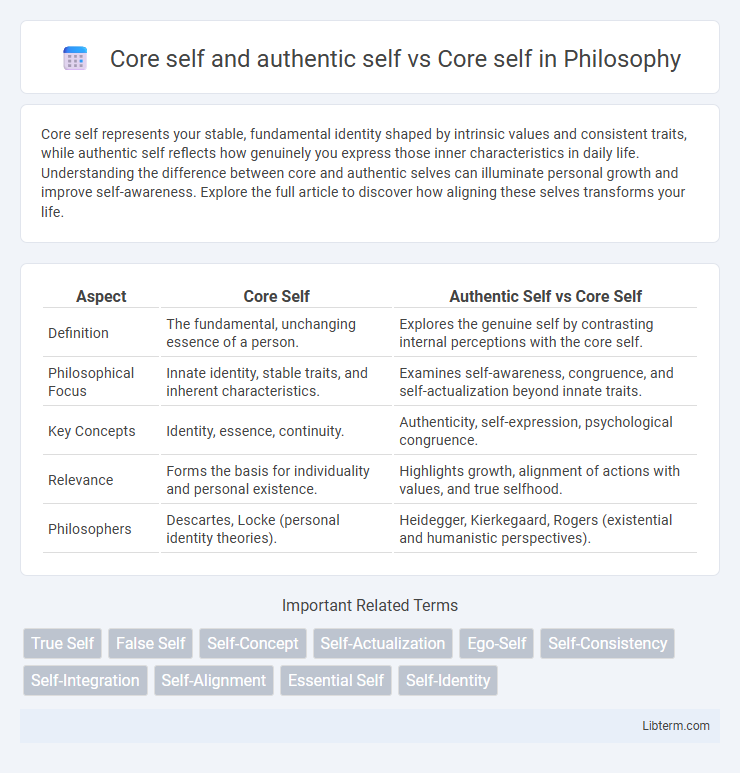Core self represents your stable, fundamental identity shaped by intrinsic values and consistent traits, while authentic self reflects how genuinely you express those inner characteristics in daily life. Understanding the difference between core and authentic selves can illuminate personal growth and improve self-awareness. Explore the full article to discover how aligning these selves transforms your life.
Table of Comparison
| Aspect | Core Self | Authentic Self vs Core Self |
|---|---|---|
| Definition | The fundamental, unchanging essence of a person. | Explores the genuine self by contrasting internal perceptions with the core self. |
| Philosophical Focus | Innate identity, stable traits, and inherent characteristics. | Examines self-awareness, congruence, and self-actualization beyond innate traits. |
| Key Concepts | Identity, essence, continuity. | Authenticity, self-expression, psychological congruence. |
| Relevance | Forms the basis for individuality and personal existence. | Highlights growth, alignment of actions with values, and true selfhood. |
| Philosophers | Descartes, Locke (personal identity theories). | Heidegger, Kierkegaard, Rogers (existential and humanistic perspectives). |
Understanding the Core Self
Understanding the core self involves recognizing the fundamental aspects of identity that remain stable across different contexts, including values, beliefs, and intrinsic motivations. The authentic self extends this concept by emphasizing congruence between these intrinsic traits and one's outward behaviors, fostering genuine self-expression. Differentiating core self from authentic self aids in deeper self-awareness and supports psychological well-being by aligning internal experiences with external actions.
Defining the Authentic Self
The authentic self represents an individual's true essence, encompassing core values, beliefs, and emotions that remain consistent across situations, distinguishing it from the broader core self that includes habits and social roles. Defining the authentic self involves deep self-awareness and alignment between internal experiences and outward behaviors, promoting psychological well-being. Neuroscientific research associates the authentic self with integrated brain activity in regions responsible for self-reflection and emotional regulation, reinforcing its foundational role in identity formation.
Core Self vs Authentic Self: Key Differences
Core self represents an individual's fundamental traits and values formed through early experiences, shaping consistent behaviors and self-perception. Authentic self reflects conscious awareness and expression of those core traits, aligned with personal beliefs and emotions in the present moment. The key difference lies in the core self as the deep-rooted foundation, while the authentic self is the genuine, lived expression of that foundation in everyday life.
The Interplay Between Core and Authentic Selves
The interplay between the core self and authentic self shapes individual identity by balancing inherent traits with true personal values and beliefs. This interaction fosters psychological well-being as the core self anchors stability while the authentic self promotes genuine self-expression. Understanding this dynamic helps individuals navigate internal conflicts and achieve congruence between who they are and who they aspire to be.
How Core Self Shapes Identity
Core self encompasses fundamental traits, values, and beliefs that serve as the foundation of an individual's identity, influencing consistent behavior and decision-making patterns. Authentic self emerges when individuals express their core self genuinely, aligning actions and emotions with intrinsic motivations and values. The interaction between core self and authentic self shapes a coherent identity, fostering psychological well-being and a sense of purpose.
Authentic Self: Living True to Yourself
Authentic Self embodies living true to your values, desires, and emotions, reflecting a deep alignment with your inner core, beyond superficial roles or external expectations. Core Self represents the fundamental aspects of identity and personality that remain stable over time, serving as the foundation for authenticity. Focusing on Authentic Self emphasizes consistent self-awareness and integrity, fostering genuine connections and fulfilling life experiences.
Integrating Authenticity with Core Values
Integrating authenticity with core values involves aligning one's genuine feelings, beliefs, and behaviors with deeply held principles that define the core self. The authentic self represents true personal identity and emotions, while the core self reflects fundamental values and enduring characteristics. Achieving harmony between these aspects fosters psychological well-being, self-coherence, and meaningful engagement in life decisions.
Recognizing Misconceptions about Core Self
Core self often gets misunderstood as a fixed, unchanging identity, whereas authentic self emphasizes genuine values and beliefs reflecting one's true inner experience. Misconceptions about core self include assuming it is synonymous with personality traits, ignoring its dynamic nature shaped by ongoing self-reflection and growth. Recognizing core self correctly involves distinguishing it from superficial self-concepts and appreciating its role in fostering psychological well-being and authentic living.
Practical Ways to Discover Your Authentic Self
Core self represents your fundamental identity, encompassing innate traits and values, while authentic self reflects the true expression of those traits in daily actions. Practical ways to discover your authentic self include mindful self-reflection, journaling to track genuine feelings, and seeking feedback from trusted sources. Consistent alignment between your actions and core beliefs enhances self-awareness and fosters authentic living.
Core Self and Authentic Self: Impacts on Wellbeing
The Core Self encompasses fundamental personality traits such as self-esteem, self-efficacy, and emotional stability, serving as a stable foundation for individual identity. The Authentic Self reflects genuine thoughts, emotions, and values, promoting psychological congruence and increased life satisfaction. Alignment between Core Self and Authentic Self significantly enhances overall wellbeing by fostering resilience, emotional regulation, and deeper interpersonal connections.
Core self and authentic self Infographic

 libterm.com
libterm.com